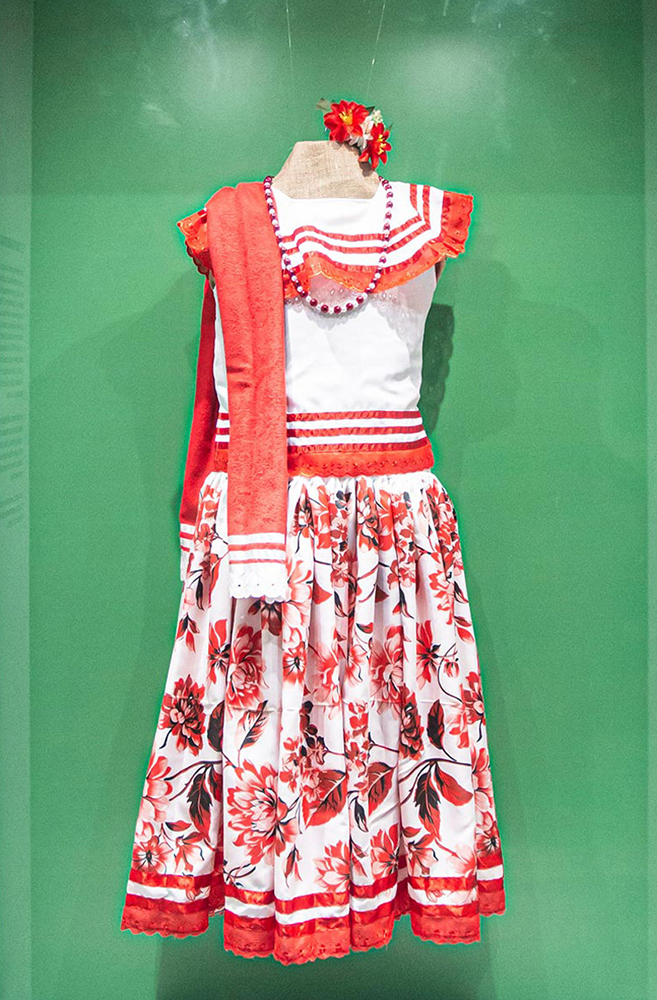You are in:
#WeAreTheAmazon
How to browse

Click on the icons to move around the room or to access points of interest. Alternatively, use the arrow keys to turn, go forward, and go backward.


Click and drag the image to explore the scene in 360°.
Alternatively, use the arrow keys to turn left and right.


Use the scroll wheel to zoom in or out.
Alternatively, use the plus and minus keys.

Virtual Tour / Marabaixo Garment
Marabaixo Garment

Marabaixo is a cultural manifestation of African origin from Amapá and gives homage to the Divine Holy Spirit and the Holiest Trinity. The festivities begin in the Easter season and end on the first Sunday after Corpus Christi, mixing African and European Catholic rites. The symbolic celebration of Black identity was recognized by the Institute for National Artistic and Historical Heritage (IPHAN) in 2018, as Brazilian Intangible Cultural Heritage.
The garments worn for the Marabaixo dance include flowered circles, white blouses, jewelry, shoulder scarves, and flowers behind the ears as a stylized version of the clothing enslaved African women wore.
In the audio recording, you can listen to the statement by Elisa Congó, president of the Favela Roots Cultural Association.
testimonial
Elisa Congó, president of the Favela Roots Cultural Association
I’m Eliza Congó, old Congó’s granddaughter and Dica Congó’s daughter. I am a business administrator, teacher, member and also founder of Amapá State “Batuque” (a drum beat) and “Marabaixo” (a type of local traditional Afro-Brazilian dance). I am a member of the “Marabaixo” management committee at IPHAN (National Historical and Artistic Heritage Institute). I work in public places, spreading our culture to the seven corners of this beautiful state of Amapá. I hold a workshop every week at school, in public buildings, where we are invited, precisely to disseminate and share all the knowledge we have on our culture from “Marabaixo”. I am also the president of a Cultural Association named “Raízes da Favela Dica Congó” (Dica Congó Favela Roots) in honor of my mother, who has passed on.
“Marabaixo” is part of the culture in the state of Amapá. It is a short-step dance, the rhythm is played on drums, where blacks and Afro-descendants demonstrate their joys and their sadness, as well as most of their endured and experienced regrets. And where, for a long time, and even today they say… In other words, they become revolutionized saying what they want, their Cry of Warnings, their repudiation. This is our culture. This is our “Marabaixo”.
A “Marabaixo” performance, it is performed by dancers, right? The dancers, the men, and the players who play the drums, who lead the rhythm of the dance. So, the Women always wear full and flowered skirts, showing the joy of that moment, white blouses with leaves covering the breasts and decorated with lace. The head is covered with flowers as well as a towel. This towel is used for wiping the sweat dripping on the face. So, I am reliving a very exciting moment. A moment of extreme joy and pleasure.
I was raised experiencing the “Marabaixo” dance steps. My mother always danced the “Marabaixo” in our house, and we always participated, right? And in this participation, you know that love… What can we get from it? We savor and feel all this love, that’s why I appreciate this culture today.
I esteem this as a commitment to my ancestors, as well as all the hardships and everything they had to put up with. And it is a great honor to participate in these moments, to be here and witness, even today, and participate in where our culture has arrived, where our “Marabaixo” has gotten to today. It is part of an intangible Brazilian heritage, and I am there in Brasília receiving this title.
Today, we have gained a little more recognition in the world. I’ve already been to French Guiana. We have already been seen in São Paulo, but very little. There is still a long way to go, that’s why we do all the work jointly with IPHAN. Nowadays, I am part of the “Academia Amapaense de Marabaixo” (Amapá State Marabaixo Academy), making this disclosure, providing this visibility, as well as the IPHAN managing committee. This management committee is committed to introducing “Marabaixo” to the world, through national and federal projects, but we also face a lot of hardships for that to happen.
It began in Amapá because of the following: the blacks came here, from the African continent, and they brought with them their drum culture and, as you know, that comes from the African continent. And when they fled, they communicated through drum beats and their drums. And as time went on, what happened? Visualizing, envisioning that they could dance to the beat of their drums. That created a new culture, a new rhythm here in Amapá state. We are also the founders, the perpetuators, as well as the maintainers… even today, the people of Afro-descendants are the ones who maintain “Marabaixo” in the state of Amapá.
So “Marabaixo” for me is faith, joy, and it’s tradition and satisfaction. I feel like my mother is beside me while I participate in all the “Marabaixo” dances. Thanks everyone, because we were all victorious here in this clod named the state of Amapá.

